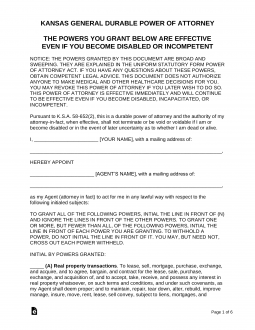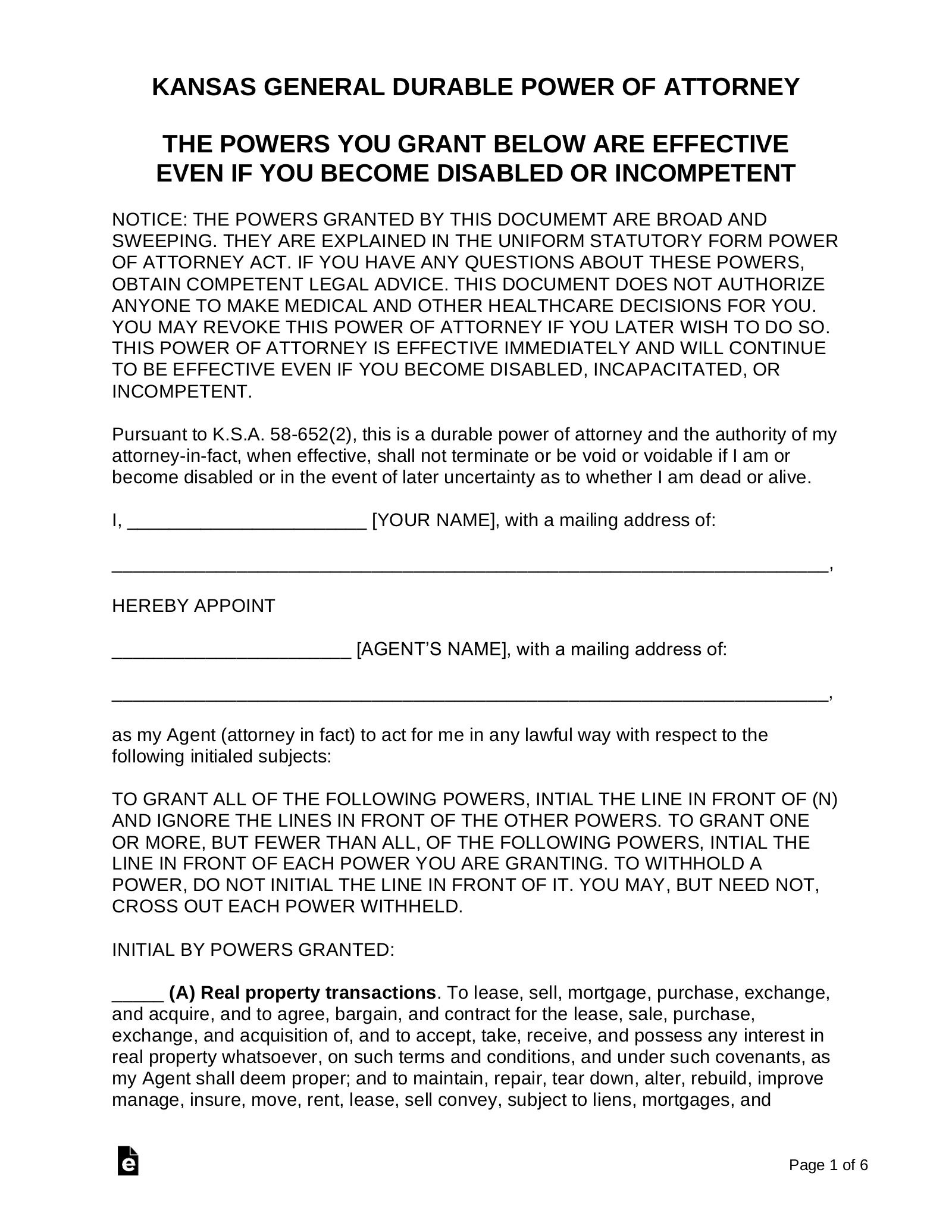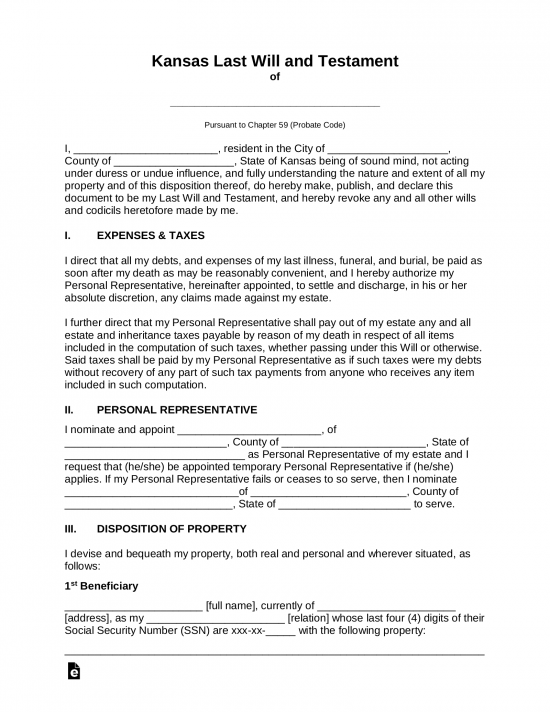Updated March 19, 2024
A Kansas durable power of attorney form is a document that transfers financial powers from a person (principal) to a trusted representative (agent). It can go into effect immediately or at a specific event and remains valid if the principal should become disabled.
Table of Contents |
Versions (2)
Download: PDF, MS Word, OpenDocument
 Hutchinson Regional Healthcare Version
Hutchinson Regional Healthcare Version
Download: PDF
Laws
Chapter 58, Article 6 (Powers of Attorney Act)
Definition of “Durable”
“Durable power of attorney” means a written power of attorney in which the authority of the attorney in fact does not terminate in the event the principal becomes disabled or in the event of later uncertainty as to whether the principal is dead or alive and which complies with subsection (a) of K.S.A. 58-652, and amendments thereto, or is durable under the laws of any of the following places:
(1) The law of the place where executed;
(2) the law of the place of the residence of the principal when executed; or
(3) the law of a place designated in the written power of attorney if that place has a reasonable relationship to the purpose of the instrument (K.S.A. 58-651(d))
Definition of “Power of Attorney”
“Attorney in fact” means an individual, corporation or other legal entity appointed to act as agent of a principal in a written power of attorney (K.S.A. 58-651(a))
Signing Requirements
The power of attorney is signed by the principal, and dated and acknowledged in the manner prescribed by K.S.A. 53-501 et seq., and amendments thereto. If the principal is physically unable to sign the power of attorney but otherwise competent and conscious, the power of attorney may be signed by an adult designee of the principal in the presence of the principal and at the specific direction of the principal expressed in the presence of a notary public. The designee shall sign the principal’s name to the power of attorney in the presence of a notary public, following which the document shall be acknowledged in the manner prescribed by K.S.A. 53-501 et seq., and amendments thereto, to the same extent and effect as if physically signed by the principal (K.S.A. 58-652(3))
Statutory Form
No statutory form for durable financial use.
How to Write
Download: PDF, MS Word, OpenDocument
Kansas Appointment
(1) Principal’s Name. The Kansas Party appointing an Agent with his or her power of authority should be identified as the Principal.
(2) Principal Mailing Address.

(3) Attorney-in-Fact Name. This is the Kansas Private Party that will accept the appointment to access the granted authority needed to carry out the Principal’s directives.
(4) Attorney-in-Fact Mailing Address.

Principal Power Review
(5) Real Property Transactions. The Principal must directly authorize every action or decision that the Attorney-in-Fact takes or makes on his or her behalf. This authorization will take the form of the Principal’s initials. If the Attorney-in-Fact is to perform actions in the Principal’s name involving real property transactions such as leasing, selling, managing mortgages, etc. on behalf of the Principal then he or she must initial the appropriate paragraph. Several more will follow defining additional topics. The Principal should only provide initials on the powers he or she wishes the Agent to wield in his or her name.

(6) Tangible Personal Property transactions. The Principal can arrange for the Agent to have the authority to represent his or her decisions and actions over principal tangible personal property by initialing the second list item, labeled “(B).”
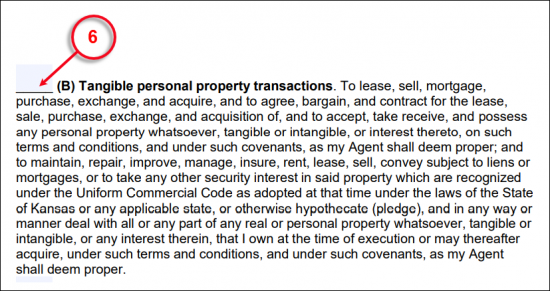
(7) Stock And Bond Transactions. The Agent can use the authority in this paperwork to effect the Principal’s stock and bond transaction directives or instructions once his or her approval is delivered through the initials of the Principal. Restrict the Agent from transactions, decisions, or any other actions with the Principal’s stocks and bonds by leaving “(C)” unmarked.

(8) Commodity And Option Transactions. The Principal must initial (D) if he or she wishes to grant the Agent the power to handle commodities futures contracts and stock options. Otherwise, if left blank, this item will restrict the Agent from these powers.

(9) Banking And Other Financial Institution Transactions. The Principal’s authority in conducting business with financial institutions and banks can be applied to the Agent’s abilities through the approval of “(E).”
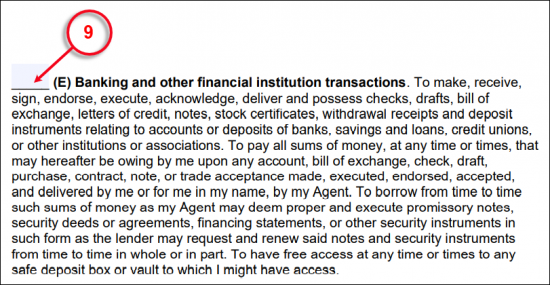
(10) Business Operating Transactions. The Principal can assign the power of conducting transactions to operate the Principal’s business ventures in any form by initialing (F).
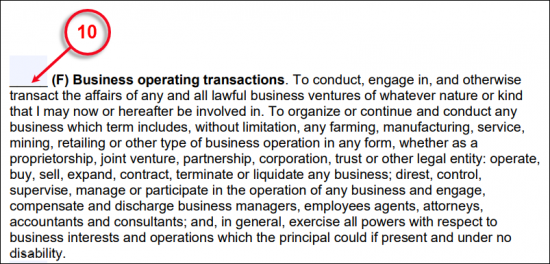
(11) Insurance And Annuity Transactions. The Principal can grant the Agent the power to handle any directive, decision, and action with his or her insurance and annuity transactions by initialing “(G).” This will not give the Agent the ability to self-appoint as the Principal’s Beneficiary.

(12) Estate, Trust, And Other Beneficial Transactions. With the exception of certain actions (i.e. changing the Principal’s will, revoking/amending trusts with the Principal name, etc.) the Principal can assign the Agent the power to carry out his or her directives over estates, trusts, and other beneficiary transactions under the Principal’s control by initialing “(H).”
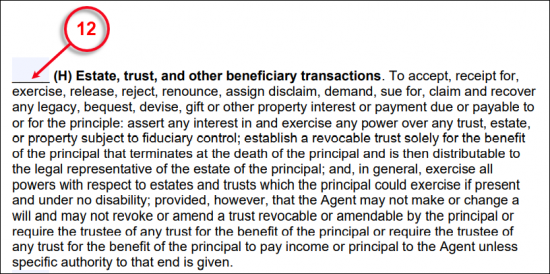
(13) Claims And Litigation. If the Principal intends to give the Agent the ability to represent his or her interests in claims and litigation involving the principal’s property then “(I)” must be initialed by the Principal.
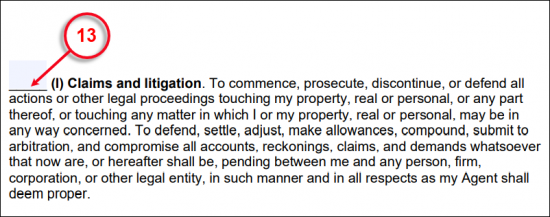
(14) Personal And Family Maintenance. If the Principal expects the Agent to hire and release Entities required for personal and family maintenance, such as accountants, consultants, clerks, or physicians then he or she should initial “(J).”

(15) Benefits. The Principal’s social security, Medicare, Medicaid, government programs, or military service directives can be taken care of by the Agent with the power the Principal grants by initialing “(K).”
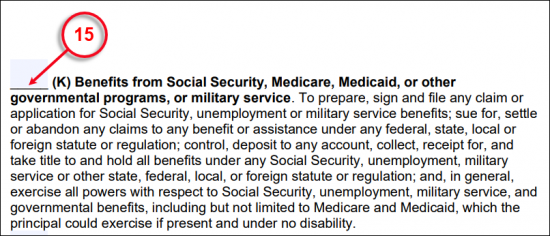
(16) Retirement Plan Transactions. Should the Principal wish the Agent to engage the principal directives regarding retirement plans and IRA’s (i.e. using the Principal’s name to maintain payments or contributions) then authorization from the Principal is required.
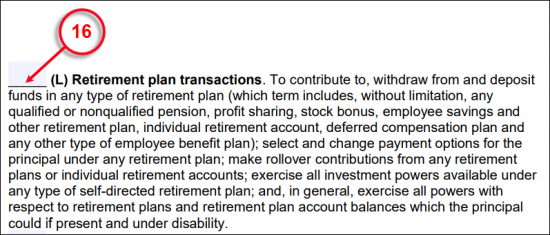
(17) Tax Matters. The Principal can name his or her Attorney-in-Fact to handle tax matters on his or her behalf. This will include executions, unemployment insurance actions, making sure the Principal is compliant, along with a host of other actions. Be advised that while the Principal’s approval will enable the Attorney-in-Fact to carry out the Principal’s tax matters with financial institutions and other organizations, the I.R.S. and any other concerned Tax Entity may have a separate set of requirements (and forms) that must be satisfied if the Agent is to carry any of the Principal’s authority before them.
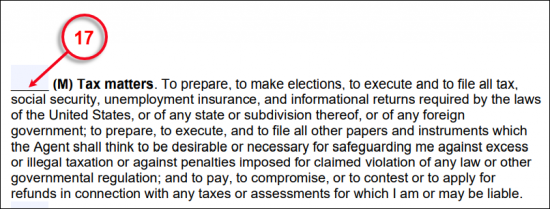
(18) All Powers. Every principal power in this list can be granted to the Agent in one fell swoop. To accomplish this task the Principal must skip over the first thirteen powers (lettered A through M) and only initial the final statement.

Special Instructions
(19) Principal Instructions. The Principal can set his or her instructions to the Agent on paper along with any limitations or restrictions to the powers being granted. This enables the Principal issuing this document to tailor its grant of authority to a level that is appropriate for the situation.

Discretionary Decision Making Powers
(20) Authority To Delegate. The power to delegate the principal powers conveyed here to another Agent can be given to the current Attorney-in-Fact through the Principal’s initials. If not, this document’s status will default to restrict such power to the current Agent.

Reimbursement And Compensation
(21) Right To Compensation. The Agent will be entitled to seek reimbursement for expenses caused by his or her representation of the Principal. However, the Principal must directly authorize the Agent’s right to compensation (for time, effort, services, etc) to include this Agent entitlement with this appointment.

Successor Agent
(22) Successor’s Identity. The Attorney-in-Fact may not always be available, able, or willing to act in this role. If so, the Principal should make sure he or she is prepared by holding an Agent in reserve. To name someone to assume the role of the Principal’s Agent, the Successor Agent’s full name and address should be listed. More than one can be named. Each one listed will be approached to assume the role of the Principal’s Attorney-in-Fact when this position becomes vacant in the order he or she is listed.

Principal Execution In Kansas
(23) Signing Date. The two-digit day of the month, month name, and two-digit year that this paperwork is signed by the Principal is required to specify when these powers become effective.
(24) Kansas Principal. The Attorney-in-Fact can only carry out the directives above utilizing the defined principal powers if the Kansas Principal signs this document to show that this grant of power is intentional. It is imperative this action be done before a Notary Public who is recognized as such by the State of Kansas so that the signing can be properly notarized.

Certificate Of Acknowledgment Of Notary Public
(25) Notarizing The Signing. The Notary Public witnessing the signing will notarize and document this action.
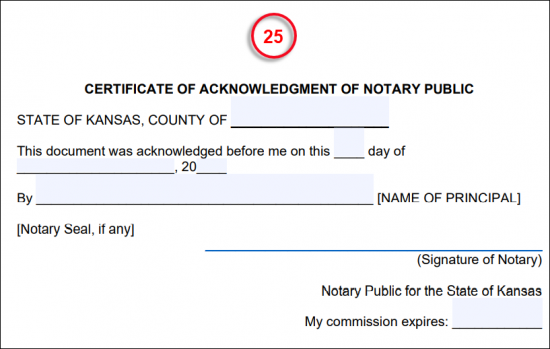
Acknowledgment Of Agent
(26) Printed Name. The printed name of the Agent is needed to complete this Party’s acknowledgment statement.
(27) Agent Acknowledgment. The Agent should sign the acknowledgment as proof of his or her intention to live up to the role expected by the Principal.

Preparation Of Statement
(28) Preparer Identity. The Party who has submitted information to this paperwork is generally considered its Preparer. This Party’s printed name and signature must be supplied for review.

Related Forms
Download: PDF
Download: PDF, MS Word, OpenDocument

